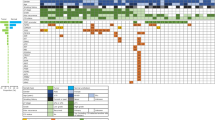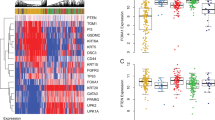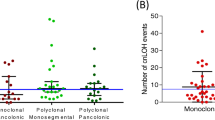Abstract
Somatic allelic loss is regarded as a hallmark of tumour-suppressor gene (TSG) inactivation. Thirty-one human bladder transitional cell carcinomas (TCCs) were examined for allelic loss at five chromosome 18q loci, including the DCC gene (deleted in colorectal carcinoma) and at chromosome 11p15 in a restriction fragment length polymorphism analysis. Allelic loss was observed at one or more 18q loci in 9/26 (35%) samples, associated with muscle-invasive disease (P < 0.02). Allelic loss was observed at DCC in 8/24 (33%) samples, associated with muscle-invasive disease (P = 0.05). Three out of the five evaluable recurrent TCCs exhibited allelic loss at DCC, two of which were superficial. No allelic losses were detected at other 18q loci in tumours which retained both DCC alleles. Allelic loss was observed at 11p15 in 5/20 (25%) tumours. These data suggest the presence of a late-acting TSG located on 18q in TCC bladder cancer. DCC is a candidate gene since it lies within the region of most common deletion (18q21.3-qter).
This is a preview of subscription content, access via your institution
Access options
Subscribe to this journal
Receive 24 print issues and online access
$259.00 per year
only $10.79 per issue
Buy this article
- Purchase on Springer Link
- Instant access to full article PDF
Prices may be subject to local taxes which are calculated during checkout
Similar content being viewed by others

Author information
Authors and Affiliations
Rights and permissions
About this article
Cite this article
Brewster, S., Gingell, J., Browne, S. et al. Loss of heterozygosity on chromosome 18q is associated with muscle-invasive transitional cell carcinoma of the bladder. Br J Cancer 70, 697–700 (1994). https://doi.org/10.1038/bjc.1994.376
Issue Date:
DOI: https://doi.org/10.1038/bjc.1994.376
This article is cited by
-
Netrin-1 and its receptors in tumorigenesis
Nature Reviews Cancer (2004)
-
Limiting the location of putative human prostate cancer tumor suppressor genes on chromosome 18q
Oncogene (2001)
-
Evidence for two candidate tumour suppressor loci on chromosome 9q in transitional cell carcinoma (TCC) of the bladder but no homozygous deletions in bladder tumour cell lines
British Journal of Cancer (1999)
-
Somatic mutation of PTEN in bladder carcinoma
British Journal of Cancer (1999)


